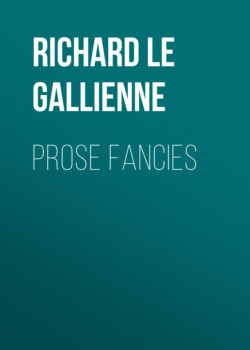Читать книгу Prose Fancies - Richard Le Gallienne - Страница 6
На сайте Литреса книга снята с продажи.
I
ОглавлениеTable of Contents
Spring puts the old pipe to his lips and blows a note or two. At the sound, little thrills pass across the wintry meadows. The bushes are dotted with innumerable tiny sparks of green, that will soon set fire to the whole hedgerow; here and there they have gone so far as those little tufts which the children call 'bread and cheese.' A gentle change is coming over the grim avenue of the elms yonder. They won't relent so far as to admit buds, but there is an unmistakable bloom upon them, like the promise of a smile. The rooks have known it for some weeks, and already their Jews' market is in full caw. The more complaisant chestnut dandles its sticky knobs. Soon they will be brussels-sprouts, and then they will shake open their fairy umbrellas. So says a child of my acquaintance. The water-lilies already poke their green scrolls above the surface of the pond; a few buttercups venture into the meadows, but daisies are still precious as asparagus. The air is warm as your love's cheek, golden as canary. It is all a-clink and a-glitter, it trills and chirps on every hand. Somewhere close by, but unseen, a young man is whistling at his work; and, putting your ear to the ground, you shall hear how the earth beneath is alive with a million little beating hearts. C'est l'heure exquise.
Presently along the road comes slowly, and at times erratically, a charming procession. Following the fashion, or even setting it, three weeks since yon old sow budded. From her side, recalling the Trojan horse, sprang suddenly a little company of black-and-tan piglets, fully legged and snouted for the battle of life. She is taking them with her to put them to school at a farm two or three miles away. So I understand her. They surround her in a compact body, ever moving and poking and squeaking, yet all keeping together. As they advance slowly, she towering above her tiny bodyguard, one thinks of Gulliver moving through Lilliput; and there is a touch of solemnity in the procession which recalls a mighty Indian idol being carried through the streets, with people thronging about its feet. How delicately she steps, lest she hurt one of the little limbs! And, meanwhile, mark the driver—for though the old pig pretends to ignore any such coercion, as men believe in free-will, yet there is a fate, a driver, to this idyllic domestic company. But how gentle is he too! He never lets it be seen that he is driving them. He carries a little switch, rather, it would appear, for form's sake; for he seldom does more with it than tickle the gravely striding posteriors of the quaint little people. He is wise as he is kind, for he knows that he is driving quicksilver. The least undue coercion, the least sudden start, and they will be off like spilled marbles, in eleven different directions. Sometimes occasion arises for prompt action: when the poet of the family dreams he discerns the promised land through the bottom of a gate, and is bent on squeezing his way under, and the demoralisation of the whole eleven seems imminent. Then, unconsciously applying the wisdom of Solomon, the driver deals a smart flick to the old mother. Seeing her move on, and reflecting that she carries all the provisions of the party, her children think better of their romance, and gambol after her, taking a gamesome pull at her teats from high spirits.
The man never seems to get angry with them. He is smiling gently to himself all the time, as he softly and leisurely walks behind them. Indeed, wherever this moving nursery of young life passes, it awakens tenderness. The man who drove the gig so rapidly a little way off suddenly slows down, and, with a sympathetic word, walks his horse gingerly by. Every pedestrian stops and smiles, and on every face comes a transforming tenderness, a touch of almost motherly sweetness. So dear is young life to the eye and heart of man.
A few weeks hence these same pedestrians will pass these same pigs with no emotion, beyond, possibly, that produced by the sweet savour of frying ham. Their naïveté, their charming baby quaintness, will have departed for ever. Their features, as yet but roguishly indicated, will have become set and hidebound; their soft little snouts will be ringed, and hard as a fifth hoof; their dainty little ears—veritable silk purses—will have grown long and bristly: in short, they will have lost that ineffable tender bloom of young life which makes them quite a touching sight to-day. Strange that loss of charm which comes with development in us all, pigs included. A tendency to pigginess, as in these youngsters, a tendency to manhood in the prattling and crowing babe, are both hailed as charming: but the full-grown pig! the full-grown man! Alas! in each case the charm seems to flee with the advent of bristles.
But let us return to the driver.
Under his arm he carries a basket, from which now and again proceed suppressed squeaks and grunts. It is 'the rickling,' the weakling, of the family. It will probably find an early death, and be embalmed in sage and onions. The man has already had an offer for it—from 'Mr. Lamb.' Mr. Lamb! Yes, Mr. Lamb at Six-Elm Farm. 'Oh! I see.' But was it not a startling coincidence?
It has taken half an hour to come from the old bridge to the cross-roads, barely half a mile. And now, good-bye, funny little silken-coated piglets; good-bye, grave old mother. Ge-whoop! Good-bye, gentle driver. As you move behind your charge with that tender smile, with that burden safely pressed beneath your arm, I seem to have had a vision of the Good Shepherd.
